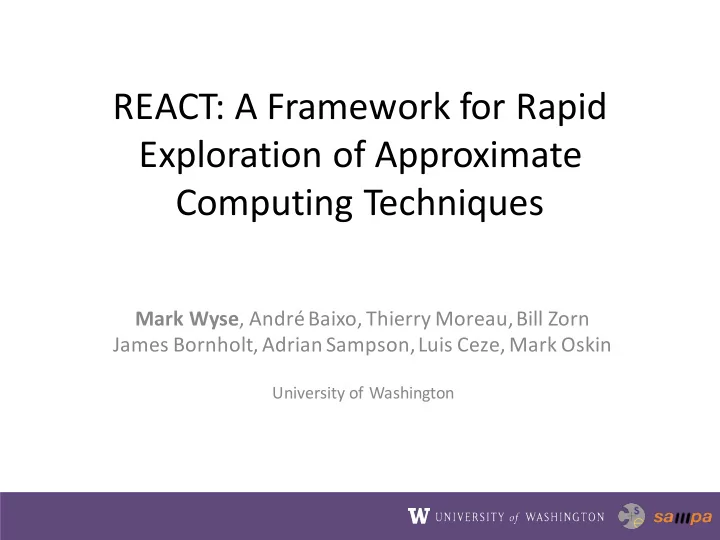

REACT: ¡A ¡Framework ¡for ¡Rapid ¡ Exploration ¡of ¡Approximate ¡ Computing ¡Techniques Mark ¡Wyse , ¡André ¡Baixo, ¡Thierry ¡Moreau, ¡Bill ¡Zorn James ¡Bornholt, ¡Adrian ¡Sampson, ¡Luis ¡Ceze, ¡Mark ¡Oskin University ¡of ¡Washington
Motivation Understand ¡current ¡research Investigate ¡new ¡techniques Evaluate ¡impact ¡of ¡existing ¡techniques
Overview Taxonomy Framework Dimensions Details Conclusions Early ¡Results
Taxonomy 𝑄 𝑦 − 𝐵 𝑦 ≤ 𝜁 ¡∀ ¡𝑦 Determinism Pr ¡ (|𝑄(𝑦) − 𝐵(𝑦)| > 𝜁) < 𝑄 ¡∀ ¡𝑦 Granularity Hardware/Software Computational ¡Resource(s)
Nondeterministic Deterministic Bit-‑Width ¡Reduction Fine ¡Grained Float-‑to-‑Fixed ¡Conversion DRAM ¡Refresh ¡Rate Fuzzy ¡Memoization SRAM ¡Soft ¡Error ¡Exposure Hierarchical ¡FPU Approximate Storage ¡(PCM) Load ¡Value ¡Approximation Soft ¡Fault Tolerance Lossy Compression ¡and ¡Data ¡Packing Synchronization ¡Elision Precision ¡Scaling ¡ALU Voltage ¡Overscaling Reduced-‑Precision ¡FPU Underdesigned Multiplier Coarse ¡Grained Algorithm ¡Selection Code ¡Perforation Error ¡Prone Processors Interpolated ¡Memoization Neural ¡Acceleration ¡(Analog) Neural ¡Acceleration ¡(ASIC, FPGA, ¡GPU) Parallel ¡Pattern ¡Replacement Parameter ¡Adjustment
REACT A ¡Framework ¡for ¡ R apid ¡ E xploration ¡of ¡ A pproximate ¡ C omputing ¡ T echniques
Application ¡Profiler ¡& ¡Energy ¡Model Intel ¡Pin ¡tool Custom, ¡linear ¡model Insn Count ¡+ ¡Arch ¡Events Simple, ¡understandable Validated ¡against ¡McPAT
Error ¡Injection ACCEPT int i, p; APPROX int a; Runtime ¡error ¡injection APPROX int data[N]; Simple ¡API a = data[i] * p; Arbitrary ¡error ¡models
Approximation ¡Models
Early ¡Results ¡-‑ Sobel ?
Early ¡Results ¡– FFT1D
Conclusions Coarse-‑grained ¡superior ¡to ¡fine-‑grained Coarse-‑grained, ¡Nondeterministic!
Thank ¡you! Questions?
Recommend
More recommend